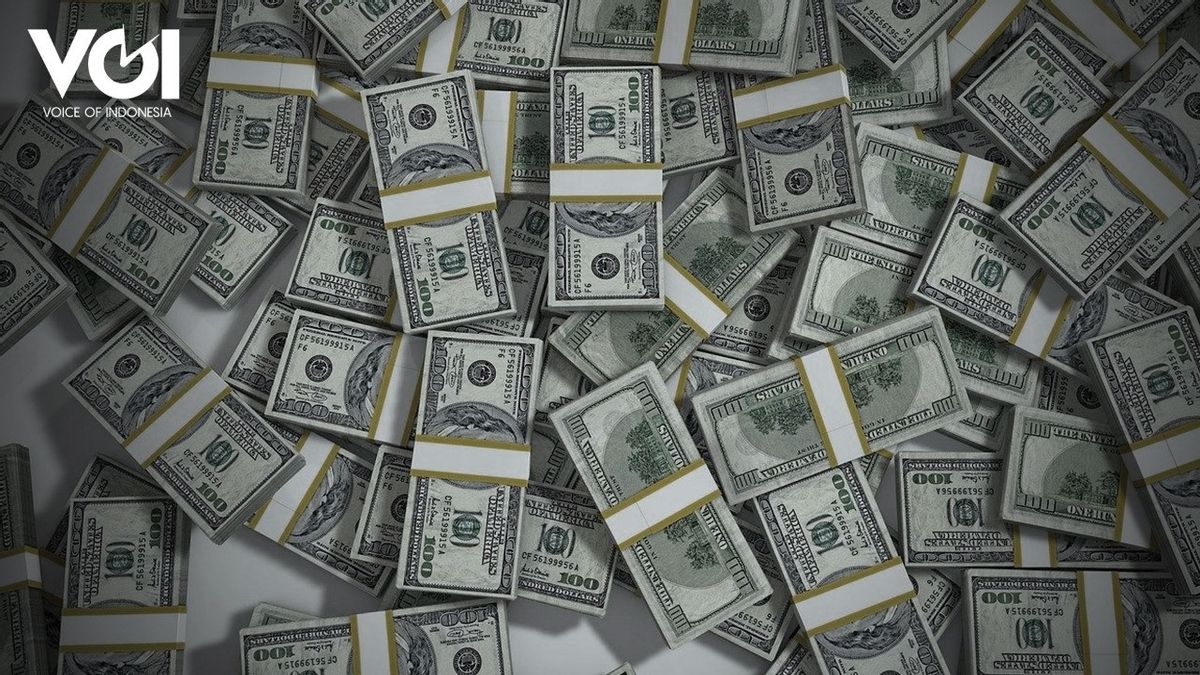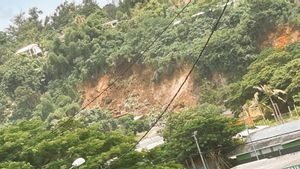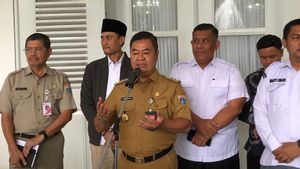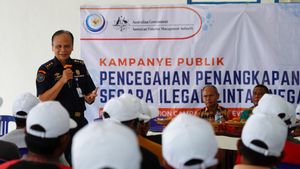In the article "Hasan Tiro and the Principle of Benefits of Aceh's Cannabis in the Period of GAM Conflict", we have seen how the Free Aceh Movement (GAM) used marijuana as their source of funding. During that period of conflict, reports also revealed the involvement of police and soldiers in the illegal marijuana trade. Part of VOI's signature Series, "Don't Panic It's Organic". Through this article, we will discuss more deeply about who actually benefits from the illegalization of marijuana.
In 2004, an estimated 30 percent of marijuana circulating in Southeast Asia came from Aceh. Unfortunately, everything is circulating under the power of the black market. The state failed to take the slightest benefit from this economic potential. Today, the push for the state to take advantage of marijuana is back, along with a push for resistance to this discourse. Actually, who benefits from illegal marijuana? The various findings we have come up with may provide some insight.
Departing from the convention of the United Nations (UN) in 1961. At that time, the UN established a legal product that was obliged to be ratified by Indonesia and other UN member states. It is hoped that the legal product will become a foundation for world countries in their efforts to eradicate narcotics abuse. For Indonesia, the ratification automatically revokes the Verdoovende Middelen Ordonnantie colonial law which was in effect, replaced by Law 9/1976.
Since then, convictions against drug users have been started. The rewards are no joke. From prison to tickets to the afterlife. After that, Indonesia again changed the national law on narcotics. The references are the same: the UN convention. The first amendment was the ratification of the United Nations Convention on Psychotropics in 1971. The ratification was adopted into the enactment of Law 5/1997 on Psychotropics.
Furthermore, armed with the results of the 1988 UN convention concerning the Eradication of the Illicit Circulation of Narcotics and Psychotropics, Indonesia made changes to Law 5/1997 to Law 22/1997 on Narcotics. Finally, Indonesia changed Law 22/1997 into Law 35/2009 on Narcotics. It is this last change - notabene still adhering to the 1988 UN convention - which is the legal basis for the eradication of narcotics to this day, where marijuana is included in group one along with heroin, cocaine, and crystal meth.
In addition, these changes also establish the National Narcotics Agency (BNN) as a state institution that deals specifically with the eradication of narcotics abuse. Sentencing is also enforced based on this law. The irony is that when the veto-holding countries - from Britain, the United States, to China - began legalizing marijuana, Indonesia never moved from this outdated point of view.
Quoted from the book Hikayat Pohon Ganja (2011) compiled by Lingkar Ganja Nusantara (LGN), it describes the condition of the marijuana business floor and its relation to the illegalization of the five finger plant. Marijuana is a threat to many other industries that first existed. Call it pharmaceuticals, fuels, to textiles. As is well known, marijuana has various benefits, from flowers to seeds and roots.
"If basic commodities such as clothing, food and shelter are still determined by the exclusive monopoly and oligopoly of a handful of corporations, in addition to the market itself in terms of production and demand, what will happen is that commodity producing countries will experience severe poverty," he wrote. .
"Especially if the country allows private or foreign companies - which usually pay very little attention to the welfare of the wider community - freely control the livelihoods of its people, in this case, by manipulating economic commodity crops."

This background plays a major role in making cannabis a forbidden plant and is feared by the whole world. The premise is that the use of marijuana will encourage the transfer of raw materials from various industries. This fearful propaganda is a toy for the superpowers. They prevent other countries from exploiting cannabis - including Indonesia, which in fact has a large pot of cannabis - while they build their own cannabis industry.
The ultimate goal, none other than to monopolize the marijuana market as widely as possible. That's what happened today. Look at the United States (US). As of October last year, the US had re-regulated cannabis policy. 46 US states have legalized the use of marijuana for a variety of purposes. From medical to recreational purposes as defined in Washington DC, Alaska, California, Colorado, Maine, Massachusetts, Nevada, Oregon, to Vermont.
Another veto-wielding country, Britain has also changed the course of its narcotics policy. The UK is now one of the countries with a fairly large market for selling cannabis. Cannabis seeds are the commodity that records the highest demand. Even so, the UK has not fully reformed the existence of marijuana in their Narcotics Act. So, even though it is traded, the use of marijuana cannot be widely practiced.
In Asia, China is one of the most successful countries in using marijuana. Data from the World Intellectual Property Organization (WIPO) notes that the Bamboo Curtain country dominates the cannabis patents with 309 out of 606 patents recorded in WIPO data. Another Asian country, Thailand has followed China's lead in harnessing cannabis. In the land of the White Elephant, the legalization of marijuana is intended for medical reasons. Its closest neighbor, Malaysia is also on its way to legalizing medical marijuana.
In Indonesia
In Indonesia, efforts to take advantage of marijuana have been made. Not only LGN with all the research and observations on the cannabis culture of the archipelago. The Community Legal Aid Institute (LBHM) together with a number of other social community organizations that are members of the Civil Society Coalition have advanced to the Constitutional Court (MK) to propose a review of Law 35/2009.
One of the points being pursued is removing marijuana from class one narcotics, along with heroin, cocaine, morphine, and opium. Class one narcotics are the most dangerous. In the eyes of the law, all narcotics in this group cannot be used for anything. So, removing cannabis from group one is the first step in utilizing the five-finger plant.
"Then the prohibition of narcotics for any group, for medical purposes, according to us, violates the constitutional right of every citizen to get health services," Maruf told VOI some time ago.

For LGN itself, they have submitted a research collaboration to the Ministry of Health (Kemenkes). Unfortunately, since it was proposed many years ago, the research has not been running. The National Narcotics Agency (BNN) that was most likely to provide marijuana for research refused to get involved. BNN adheres to Law Number 35 of 2009 concerning Narcotics, which states that marijuana as a class one narcotic cannot be used for anything, including medical. The BNN even has a different version, that marijuana is actually detrimental to health.
I don't know which researcher is meant by BNN. What is clear, the food and drug regulatory agency of the United States (US), the Food and Drug Administration (FDA) has stated that the cannabidiol or CBD content in the cannabis plant can be used as a seizure medication due to epilepsy. Quoting CNN Indonesia writing which launched HowStuffWorks, Joshua Kaplan, a cannabis researcher from Western Washington University, called CBD a compound that is very much in tune with the work of the human body.
CBD works to activate serotonin receptors, which play an important role in treating anxiety. Interestingly, CBD is identical to endocannabinoid, a chemical compound that is naturally produced in the human brain. Endocannabinoids have a major influence in controlling a person's motor, cognition, emotions, and behavior. This means that everyone has "marijuana" in each of them. "The serotonin system plays an important role in treating anxiety," says Kaplan.
Apparatus precedent on the black market
Dhira Narayana, Chairman of the LGN questioned the premise of why the authorities in Indonesia are so anti to the discourse on the use of marijuana. Never mind legalizing. Doing research any anti authority. In fact, according to Dhira, there is no reason for Indonesia to stick to the outdated Law 35/2009. Because, in fact, the UN convention provides flexibility for each country to regulate the management of their own cannabis plant.
This is what developed countries then do. They are aware that the most important point of legalizing marijuana is to transfer the power of circulation of marijuana from the black market to the state. Uruguay, for example. Since July 2017 Uruguay has officially become the first country in the world to fully legalize marijuana. In Uruguay, marijuana consumption is shrouded in various standard rules regarding who and how the consumption of marijuana is legally permitted. There, marijuana users must legally register with the government. Even when buying marijuana.
Everyone should do a fingerprint scan. This is done to control the amount of quota for marijuana purchases by individuals. The figure set by the Uruguayan government is 40 grams per month. Eduardo Blasina, founder of the Montevideo Cannabis Museum, called this a step forward as well as a big responsibility for the country.

However, there was no other choice. Apart from income cases, legalizing marijuana is a way for the government to suppress the domination of drug cartels and mafia in the black market. "The big responsibility we have in Uruguay is to show the world that a system of freedom with this rule works better than a ban," Eduardo was quoted as saying by the New York Times.
Like Uruguay. Indonesia has a dark record regarding the involvement of legal authorities in the black market. During the conflict in Aceh, the cannabis trade flow from Aceh was very massive. Not only is the Free Aceh Movement (GAM) separatist group using marijuana as their source of funding, the report released by the Transnational Institute also notes the involvement of police and soldiers in the illegal marijuana trade.
A report reveals a case in which a police helicopter pilot was arrested after flying with 40 kilograms of marijuana which he admitted was going to the police chief in Aceh Besar district. Another, in 2002, an army truck was intercepted after passing through Binjai, North Sumatra with a load of 1,350 kilograms of marijuana. The interception sparked a shootout between the police and the military, in which six policemen and one soldier were killed.
Follow the Writing of this edition of Series: Don't Panic It's Organic
The English, Chinese, Japanese, Arabic, and French versions are automatically generated by the AI. So there may still be inaccuracies in translating, please always see Indonesian as our main language. (system supported by DigitalSiber.id)










